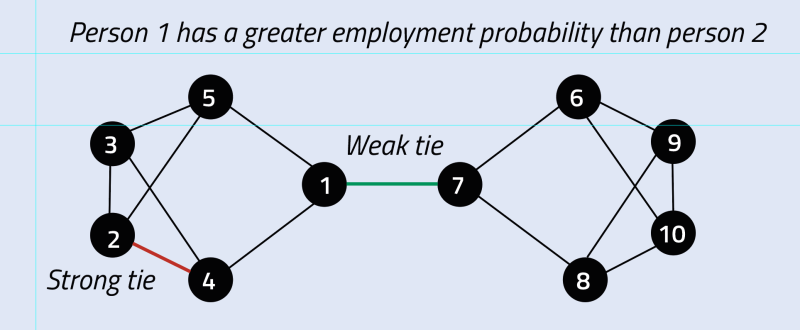Sofía Ruiz-Palazuelos, María Paz Espinosa, Jaromír Kovářík, 2024, European Economic Review, 160, pp.104594
»
Individuals with friends in diverse social circles may have better employment prospects
than those with tightly clustered circles of friends
RESEARCH QUESTION
Imagine securing your job through a conversation at a dinner with friends. The saying «It’s not what you know, but who you know» is not just a cliché, it is actually supported by empirical evidence. Studies reveal that between 30% and 50% of jobs are obtained through personal connections, highlighting the importance of understanding how social networks influence employment outcomes.
A stylized fact of real social networks is the presence of overlapping friendship circles: people’s friends are often friends with each other. Empirical evidence documents differences in groups’ propensity to form transitive relationships, representing a potential source of inequality in job seeking.
How do overlapping friendship circles impact employment? We delve into this question using a theoretical model. Individuals are connected within a network and receive random information about job opportunities. Employed individuals share this information with their unemployed contacts, while unemployed individuals retain the information for themselves. We examine the impact of overlapping friendship networks on both employment and wages.
PAPER’S FINDINGS
We find that overlapping friendship networks generate stochastic affiliation in the information flows received by agents, reducing their employment probability. Stochastic affiliation is a strong form of correlation, where several events have a greater likelihood of occurring simultaneously. In our context, these events are receiving redundant information or no information at all. The identified effect of overlapping networks is not minor: individuals with friends in diverse social circles may have better employment prospects than those with tightly clustered circles of friends, even if the former contain fewer information providers or a greater number of job competitors.
Our research challenges two seminal studies on social networks in the labor market. First, we find that the results in Calvó-Armengol (2004) only apply in networks where individuals’ friendships lack connections and shared contacts. Second, we offer a new perspective on Granovetter’s (1973) theory of «The Strength of Weak Ties». This theory posits that people are more likely to find employment through weak ties—acquaintances with whom they have infrequent contact—than through strong ties—close family or friends. According to this theory, this is because weak ties connect individuals in different social settings, providing access to novel information. Our research demonstrates that weak ties—which according to Granovetter are likely to be those linking people with few or no mutual friends—are advantageous even when the content of the information provided by both types of ties is identical. Thus, the value of weak ties may not lie solely in the content of the information they provide, but also in their ability to effectively disseminate information.Regarding wages, individuals with overlapping friendship networks have lower incomes due to their higher unemployment probability. However, conditioned on being employed, they can be expected to earn higher wages, as they are more likely to receive multiple job offers to choose from.

FUTURE RESEARCH
«The strength of weak ties» is, to date, the most cited work in all the social sciences. Numerous empirical studies have attempted to assess its validity, yielding diverse results. One possible explanation for this diversity might be that many of these studies do not provide information on the number of three-cycles people form with their contacts, and/or the number of squares they are embedded in. Examining both cycles’ impact on employment might explain why empirical findings differ.
Secondly, our findings are based on the assumption that individuals share job information mechanically. However, the decision to share job information can also be strategic. Our understanding of the impact of networks on employment would benefit from exploring such strategic considerations when job information is passed on.
REFERENCES
Calvó-Armengol A. (2004) «Job contact networks», J. Econom. Theory, 115 (1), pp. 191-206
Granovetter M.S. (1973) «The strength of weak ties» Am. J. Sociol., 78 (6), pp. 1360-1380
→ This article was issued in AMSE Newletter, Summer 2024.






